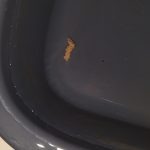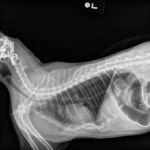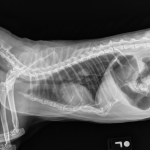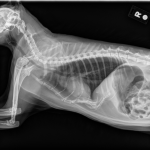It looks like it might be a tapeworm? You can bring it to your vets office and they can help identify it. Also.
There is a lot of information about them online. I tell my clients to treat for fleas.
Heya! I have desperate questions regarding UO for my 10 month old kitty! My kitty was in the hospital for three days in IV fluids and catheter treatment. His levels improved and they released him yet his urine was still bloody, according to his doctor. After catheter removal, how long does it take for my kitty to return to a normal restroom routine? And will my kitty have some symptoms of his sickness continue? (slight shivering, crying out, licking his bits). He is going to his restroom frequently but is producing decently amount of urine; quarter sized to palm of my hand amount. He is also eating and drinking water. How long until his inflammation clears up around his area? And when should I see him back at the vet? I’m trying to be patient but I can’t stand to see him in pain 🙁
Comments
I have no idea what it is nor have I ever seen anything like it. It’s definitely a live worm because it’s moving. Can somebody please explain to me what the heck this is?!?
Comments
I have a 7 yr old (8 in October )unneutred Belgian Malinois who is showing signs of stiffness in his hips. Can you give me some ideas of joint supplements that I can get with out a prescription? Thanks!
Comments
PYOMETRA SURGERY QUESTION: I have a question for Dr. Krista. Below is background information and I will include cost info for anyone that might be searching for cost information in the future and stumbles across this website. (also uploading a picture of doggie with stitches to gallery)
My 7.5 year old Shepherd/Husky mix just had surgery for pyometra. It was approximately $2000 at a pet hospital in Tennessee for the surgery. (actual surgery was a little under $900 and then additional things such as anesthesia, overnight boarding charge, IV, antibiotics, e-collar, medication, etc ended up racking up the charges to almost $2000.) Her symptoms that caused me to go to the vet were not eating, depressed, excessive drinking, constant licking her private areas, and I did notice she was drooling a lot as well. Her not eating was the main thing that had me worried as this dog will eat anything and gobble her food up in seconds and then lick the bowl clean searching for any missing bits under normal circumstances, yet she even turned her nose up at her favorite foods. I had initially been worried about blockage since she had eaten some table scrap bones a few days prior (which I now know not to do for future reference), but after googling , I came to the conclusion pyometra was more likely. She had just finished her heat cycle a few weeks prior, so everything lined up on her symptoms matching pyometra. The vet did an x-ray and blood work and it did end up being Pyometra. I had never heard of this before and really wish I had as this was an expensive lesson for us to learn and painful for our poor doggie. If we had spaded her when she was younger, it would have been $250 at the exact same place I just paid $2000 to for pretty much the exact same surgery. (though now much riskier and doggie sick) The vet did the surgery the morning following her initial examination. (the initial exam was $425 for exam, x-ray and blood work and was not included in the cost of surgery. I received a 25% discount off of this price for being a new customer) She had the surgery at 10 AM and stayed the night to get extra fluids and antibiotics as she had a pretty bad infection and keep and eye on her. I picked her up at 2 PM the day after her surgery. My doggie was happy to see me when I picked her up and seemed to be feeling much better. She wagged her tag and happily jumped in the car and was excited about going in our house. Once in the house, she visibly drooped, though. I thought that was probably normal after having surgery and she slept a lot. She ate that night and I gave her the medicine in her food. This morning, however, she once again refuses to eat- even her favorite foods. She drinks normally, but doesn’t eat anything, so I also cannot give her the medication, which consisted of an antibiotic and pain pill. I tried forcing a piece of bread in her mouth with the pill inside it but she just spit it out. My question for Dr. Krista or anyone who has had experience with pyometra…. is this normal for a dog not to want to eat a couple of days after surgery? It has now been almost exactly 48 hours since her surgery. She went to the bathroom a little bit ago and both urinated and had a wet bowel movement. I have tried offering all different kinds of foods and she shows no interest. She is just laying around. She is still drooling more than normal, but seems in better shape than when I initially took her to vet… but worried about her lack of appetite. How I can give her the medication if she will not eat. Any recommendations?
Comments
My rescue dog is a Miniature Chihuahua and today she broke her front left leg and I have no funds to help her until I get my Disability check next month.I was already taking her to the vet as soon as my check came.I don’t know what to do, she is everything to me and in awful pain and I have Never felt so helpless in my life.We have a very strong bond and I love her so much please help her I don’t know what to do I just want to die for real please help Thank you Gina
Comments
Attached below I have x-rays of my 12 year old cat. He has been having problems eating and breathing for a while. I thought that it was nasal polyps, but Dr. Krista told me that that was most likely not the case. The x-rays taken at his regular vet below show that he has something pinching in the middle of his esophagus. He can only eat a couple licks of watered down food, then walks away with a pained look in his face. I’m asking if anyone has ever had this situation with any other pets before. I will be scheduling an ultrasound at Jarrettsville vet ASAP in order to find out if there is anything that can be done to alleviate his struggling to breathe and eat. We are using transdermal prednisone to help with any inflammation. Also, his recent bloodwork has been great except for his glucose being a little high.
Comments
My miniature Schnauzer has a double ear infection .
Comments
my cat is maybe 1 1\2 – 2 ish years old. she is not fixed but she has always been very healthy and active and very into food and snacks. i couldnt find her for dinner time and thought maybe she was just sleeping somewhere hard, when she finally came out she did not seem interested in me making her food, i showed her the can and she slowly walked into the kitchen, no meowing or jumping on the table as usual. when i put her food down she sniffed it and walked away. since then she has been laying down, she has an odd expression on her face that seems very blank. her stomach seems to hurt as she stayed hunched over when she stands or moves and growled when i was trying to feel it. when she does stand or move she does it very slowly and as if she doesnt have enough strength to do so. she tried to stretch once and her back leg only shook a little, she tried to get up and move and meowed in pain. every now and then her ears seem very warm. she has recently had her first hairball from her new sister cat that has long hair. she has eaten the same dry food and about a quarter of a can of wet food at night and in the morning. shes not eating or drinking and she has not vommited since a hairball the other day or had diarhrrea.
Comments
Good Morning Pawbly friends-
I have a corn cob question… Thursday (a week ago) Rontu threw up a bunch of grass and a white blob. We could not figure out what the heck it was, or where he got it from. He was fine- running, playing, pooping. I always check their poo schedule and make sure it looks normal- sorry I’m weird. Anyway, Friday evening on our walk he pooped and I swear it had a chunk (pretty sizeable) of corn cob in it. We do not eat corn, so I have no idea when or how he got into corn. Especially this time of year when none of the fields around us are growing yet. Then again on Saturday morning on our long walk around 11, he passed another, much smaller chunk of cob. He had already done a normal poo at our early morning walk. He has been acting normal ever since. My original “plan” with all of this covid going on was to watch him closely and see if he passed it, which he seems to have. He is having normal bathroom and has been eating and drinking normally- so I thought we dodged that bullet. But every so often, he is slow to get up- and his back legs quiver. After he has a poo, it stops and he is running and playing and having a ball. It happened this morning and Monday morning. So my question is, does this warrant a trip to the vet? I hate to bother everyone during this hard time. And could it be related to the corn cob somehow? Sorry for the long post.
Comments
I have a 10-1/2 black lab that you (Dr. Morgan) has seen over the years. Lilly started sneezing yesterday and last nite and today she has had a nose bleed. What could be causing this? Thank you!













Hello,
I cannot answer this question other than saying if he isn’t doing well you should recheck with your vet. I do thee following for my UO kitties. Pain meds; zorbium and gabapentin. Antibiotic: usually convenia and I teach families how to give sq fluids at home. I also teach them how to palate the bladder and put them on a canned urinary prescription diet.
Of the bloody urine persists take an Xray to look for a stone or an ultrasound to look for abnormalities in the bladder.
Good luck.
Heya Kristia! Thank you for your reply! He actually is on some pain medication and antibiotics! He takes both every 12 hours. And it does seem like he is peeing more than I initially explained. But I am curious if you have any tutorials up on how to do a Sq fluids at home? Again thank you for being helpful.